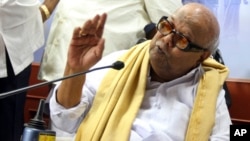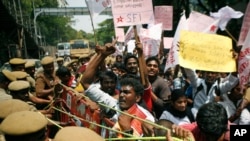NEW DELHI —
Discord in India about a United Nations resolution on war crimes committed during Sri Lanka’s civil war has prompted a key regional ally to pull out of the coalition government. The government says its stability is not under threat, but the Congress-led alliance has become more fragile.
The DMK party, which announced Tuesday it will quit the government, is based in the southern Tamil Nadu state, which has a majority Tamil population. The party has demanded that the government amend an American-sponsored resolution at the United Nations Human Rights Council to declare that Sri Lanka committed genocide against its minority Tamil population in the last stages of a civil war which ended a quarter century Tamil insurgency. The DMK also wants the U.N. resolution to press for an international inquiry.
The U.N. resolution calls on the Sri Lankan government to investigate possible human rights violations during the campaign.
The Congress-led government has not revealed yet what position it will take when the U.N. resolution is put to vote later this week. The DMK party also wants Indian parliament to pass a resolution similar to the one in the United Nations.
The Sri Lankan government has not met commitments to rehabilitate its Tamil population, the spokesperson of the party, T. K. Elangovan, told parliament.
“It is the moral duty of the government of India to see that these assurances were fulfilled or else to put pressure on the government of Sri Lanka to see these assurances are kept up. Why India is a silent spectator," he asked.
The government faces a dilemma. On the one hand, it is under pressure from ethnic Tamil parties like the DMK to take a tough stand against Sri Lanka on the question of alleged rights violations against Tamils. But it does not want to anger its tiny neighbor for fear that it will move closer to China.
The DMK has 18 seats in the lower house of parliament. This includes five government ministers. Its withdrawal makes the Congress alliance, which is already in a minority, more vulnerable.
However, Finance Minister P. Chidambaram said there is no “crisis” for the government.
“Let me assure everyone that the stability of the government and the continuance of the government are not an issue," he said. "The government is absolutely stable.”
The government is holding talks with the DMK party to find a way out of the current impasse. Unless it can bring the Tamil party back on board, it will have to depend on small regional parties to pass legislation and will face more political uncertainty in the last year of its five-year term.
The DMK party, which announced Tuesday it will quit the government, is based in the southern Tamil Nadu state, which has a majority Tamil population. The party has demanded that the government amend an American-sponsored resolution at the United Nations Human Rights Council to declare that Sri Lanka committed genocide against its minority Tamil population in the last stages of a civil war which ended a quarter century Tamil insurgency. The DMK also wants the U.N. resolution to press for an international inquiry.
The U.N. resolution calls on the Sri Lankan government to investigate possible human rights violations during the campaign.
The Congress-led government has not revealed yet what position it will take when the U.N. resolution is put to vote later this week. The DMK party also wants Indian parliament to pass a resolution similar to the one in the United Nations.
The Sri Lankan government has not met commitments to rehabilitate its Tamil population, the spokesperson of the party, T. K. Elangovan, told parliament.
“It is the moral duty of the government of India to see that these assurances were fulfilled or else to put pressure on the government of Sri Lanka to see these assurances are kept up. Why India is a silent spectator," he asked.
The government faces a dilemma. On the one hand, it is under pressure from ethnic Tamil parties like the DMK to take a tough stand against Sri Lanka on the question of alleged rights violations against Tamils. But it does not want to anger its tiny neighbor for fear that it will move closer to China.
The DMK has 18 seats in the lower house of parliament. This includes five government ministers. Its withdrawal makes the Congress alliance, which is already in a minority, more vulnerable.
However, Finance Minister P. Chidambaram said there is no “crisis” for the government.
“Let me assure everyone that the stability of the government and the continuance of the government are not an issue," he said. "The government is absolutely stable.”
The government is holding talks with the DMK party to find a way out of the current impasse. Unless it can bring the Tamil party back on board, it will have to depend on small regional parties to pass legislation and will face more political uncertainty in the last year of its five-year term.








